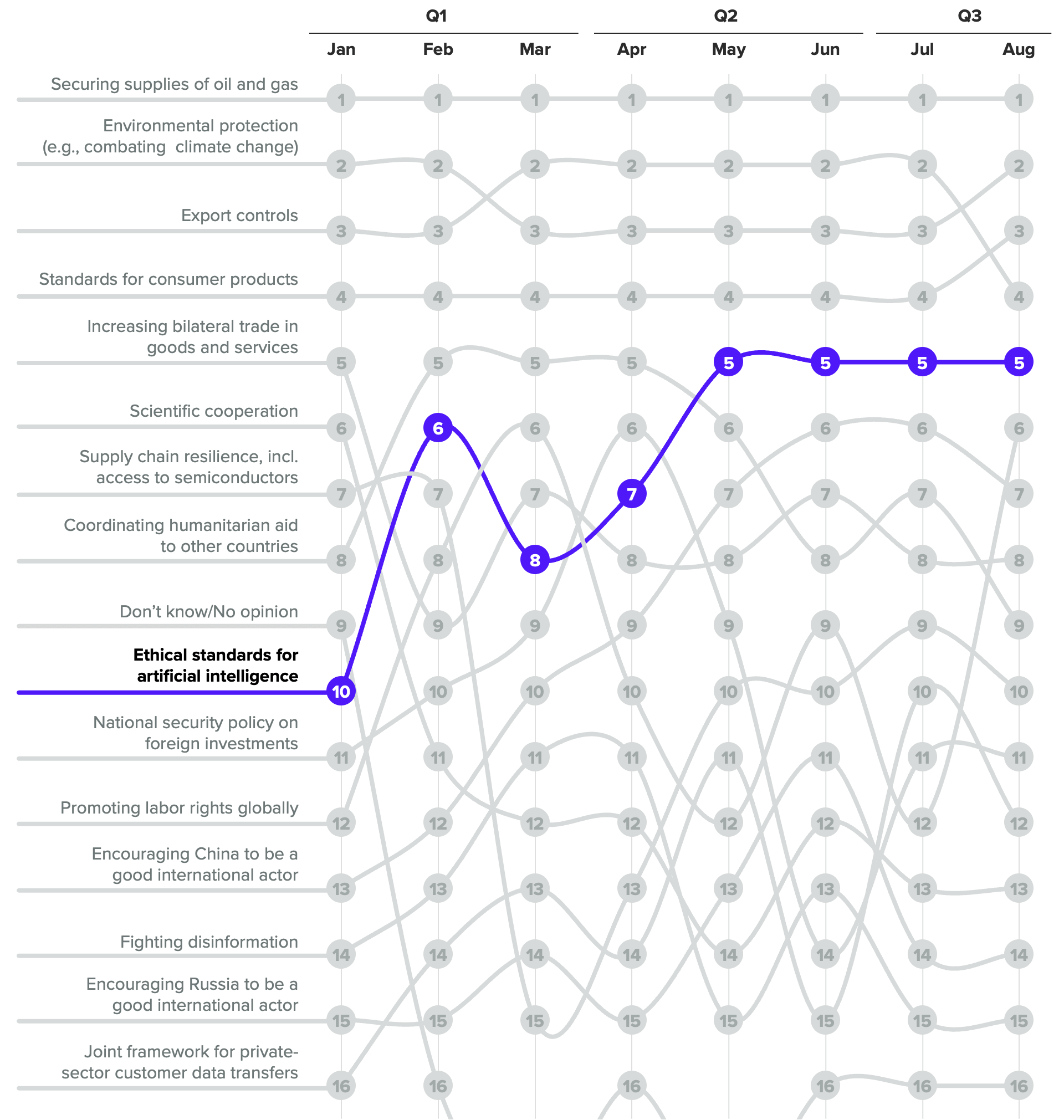Responsible AI Jumps Up the Priority List for U.S.-E.U. Cooperation

Key Takeaways
U.S. and E.U. adults increasingly say they want to prioritize cooperation on AI ethics as buzz over the dangers of AI remains at a fever pitch.
U.S. adults are particularly likely to support bilateral cooperation with Europe to set AI rules of the road. The desire for more cooperation has enabled the completion of a joint AI roadmap with a distinctly European flair.
Companies should read the tea leaves: Draft E.U. regulations demand explainability of model output in AI applications labeled as high risk. This approach will appeal to the U.S. public and to U.S. legislators by extension.
Companies that invest in research and development on AI safety and traceability will be on the front foot with concerned consumers and regulators.
For the latest news and analysis on how business, politics and economics intersect around the world, sign up for our daily global news briefing.
In recent years, public opinion has played an increasingly important role in trade policy. Especially in the trans-Atlantic context, this has led to changes in negotiating positions. Since lobbying on technical trade issues was previously dominated by concentrated special interest groups, this shift has forced trade advocates and negotiators to rethink the way they engage with the public. As such, it is now key for industry organizations and officials to have their finger on the pulse of which trans-Atlantic trade issues are rising or falling in importance for populations on both sides of the pond.
The rise of AI (on the agenda)
In the last 10 months, the emergence of large language models has captured the public’s attention — stoking both admiration and concern — and simultaneously lit a fire under like-minded governments to agree on clearer standards for so-called responsible artificial intelligence. This rapid rise in the perceived importance of AI ethics can likewise be seen in data on what economic issues U.S. adults think are most important to tackle with E.U. allies. For Europeans in the four largest E.U. countries, this topic has also seen the largest recent increase in prioritization.
Desire for Trans-Atlantic Coordination on AI Ethics Rose Sharply in Q1 2023

U.S. data derives from monthly surveys conducted among representative samples of roughly 2,200 U.S. adults, with unweighted margins of error of +/-2 percentage points. European data derives from surveys conducted among representative samples of roughly 1,000 adults per country, with unweighted margins of error of +/-3 percentage points each. The European trend line was ranked from a simple moving average of the shares selecting each issue in France, Germany, Italy, and Spain.
At the top of the list of priorities are evergreen issues that rarely decline in importance for respondents. For both U.S. and European adults, these include cooperation on energy supplies, environmental protection and safety standards for consumer products. For Europeans only, scientific cooperation is perennially high on the list, while export controls on dual-use critical technology has been in the top five for U.S. consumers as tensions with Russia and China run high, but sits at No. 8 for E.U. adults.
Americans are more keen on working with Europe on AI ethics than vice versa
While adults on both sides of the Atlantic are fairly aligned on their prioritization of most of the topics on the list, U.S. adults place cooperating on AI ethics four positions higher than their European counterparts do.
U.S. Adults Place AI Cooperation in Fifth Place, While Europeans Have It in Ninth
Our view is that the average European may not immediately see as great an urgency for cooperating with the United States on AI ethics because the European Union has been out in front on regulation via its AI Act, whereas U.S. regulation is embryonic. American consumers’ concerns nevertheless align with Europeans’ risk-based approach, and they may see Europe as a partner in providing some of the answers for how to deal with this pressing issue.
Public concern with AI pulls the United States closer to Europe’s risk-based approach
Against the backdrop of growing concern among both the public and technocrats, the fourth ministerial meetings of the U.S.-E.U. Trade and Technology Council in May focused heavily on AI — and in particular generative AI. The meetings led to the launch of a new joint trans-Atlantic roadmap for responsible AI that explicitly advocates for a risk-based approach along European lines.
Specific demographics at scale: Surveying thousands of consumers around the world every day powers our ability to examine and analyze perceptions and habits of more specific demographics at scale, like those featured here.
Why it matters: Leaders need a better understanding of their audiences when making key decisions. Our comprehensive approach to understanding audience profiles complements the “who” of demographics and the “what” of behavioral data with critical insights and analysis on the “why.”
Companies must read the tea leaves. AI firms that place risk mitigation at the center of their business model will be on the front foot with increasingly safety-conscious consumers and the politicians who represent them. The draft E.U. AI regulations include explicit requirements on traceability — or the ability to explain how the AI reached a given output — in applications designated as high risk. Understanding how AIs come to individual decisions or output is an area of active research for many AI models, including the large neural networks underpinning large language models. Companies that are investing in those capabilities up front will have a head start in compliance after the passage of the E.U. AI Act, and with sympathetic U.S. consumers and policymakers.
Sonnet Frisbie is the deputy head of political intelligence and leads Morning Consult’s geopolitical risk offering for Europe, the Middle East and Africa. Prior to joining Morning Consult, Sonnet spent over a decade at the U.S. State Department specializing in issues at the intersection of economics, commerce and political risk in Iraq, Central Europe and sub-Saharan Africa. She holds an MPP from the University of Chicago.
Follow her on Twitter @sonnetfrisbie. Interested in connecting with Sonnet to discuss her analysis or for a media engagement or speaking opportunity? Email [email protected].

